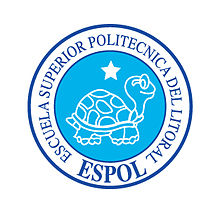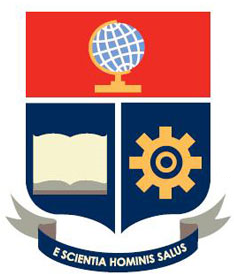Interim Results TEEB Ecuador presented at the
First Latin American Conference of the Ecosystem Service Partnership (ESP)
Large irrigation infrastructure projects were implemented to set Ecuador on a transformation pathway for its agriculture sector. Various cross-sectoral stakeholders are currently working towards achieving inclusive and sustainable growth in the cocoa value chain, incorporating the value of diversified agro-ecosystems into land-use planning in agricultural landscapes. The issues around irrigation projects and their consonance with this growth strategy was the subject of a TEEB Ecuador panel discussion at the Ecosystem Service Partnership (ESP) Conference in Colombia.
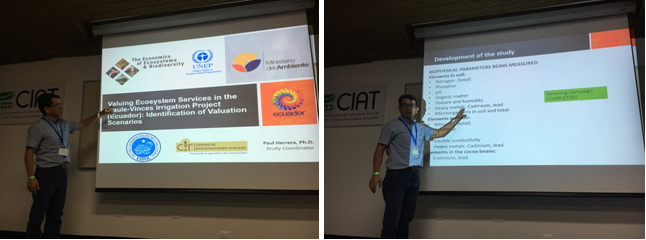
TEEB Ecuador participated to the First Latin American Conference of the Ecosystem Services Partnership (ESP) held in the city of Cali (Colombia) from 18th to 21st of October. The team of the Escuela Superior Politécnica del Litoral (ESPOL), presented the first interim results of the TEEB process: “Integrating the Value of Ecosystem Services in the Ecuadorian Cocoa Value Chain”. A pilot study is being conducted in the influential area of the Daule-Vinces Irrigation Project. This is one of the emblematic infrastructure projects, that is intended to facilitate transformation of the productive matrix in Ecuador.
The abstract presented at ESP primarily addressed the identification of valuation scenarios, based on a typology (profiles) of agricultural practices and certain characteristics of farmers. The profiles were obtained by applying multivariate statistical techniques on, among others data, survey results from 1.317 smallholder farmers. The profiles of survey respondents are summarized in the following table:
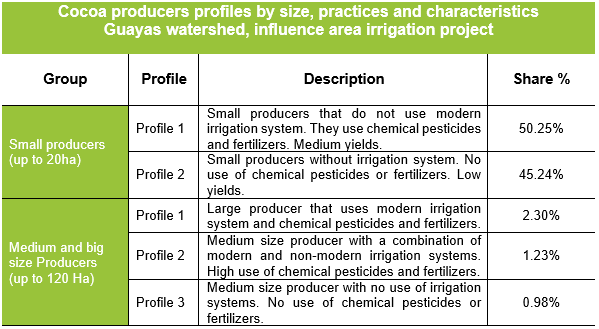
The study will further analyze the impact of different policy scenarios on productivity growth and local livelihoods:
(I) SCENARIO 0 (Business as usual): A marginal increase of the area of cocoa production in the influential area of the Dauvin irrigation project; agricultural practices do not change significantly, resulting in a reduction of ecosystem services provisioning. The irrigation project does not produce the expected benefits in relation to agricultural productivity, and does not improve the living conditions of the rural poor.
(II)SCENARIO 1 (Unsustainable development path): A significant increase of the area of cocoa production in the influential area of the Dauvin Irrigation Project (50% of the area with mid to rich agro-ecological conditions). The size of producers remains the same, and as agricultural practices do not change, there is a reduction in ecosystem service provisioning. The irrigation project has a positive effect on productivity, but because of the unchanged practices, there is no significant improvement in livelihoods (particularly in the case of small farmers).
(III) SCENARIO 2 (Sustainable development path): There is a significant increase in the area of cocoa production in the Dauvin Irrigation Project (50% of the area with mid to high agro-ecological conditions) with the same distribution of small, medium and large-scale producers ; sustainable agriculture practices are applied, resulting in an increase of ecosystem service provisioning. The irrigation project results in increased agricultural productivity, and also the living conditions related to environmental issues are better (particularly in the case of small farmers).
Three types of cultivation, harvest and post-harvest agricultural practices are being evaluated: (I) practices that affect soil fertility (such as fertilizers and pesticide use); (II) those that affect water quality (such as the use of drains or sources of irrigation); and (III) those that affect the quality of the cocoa bean, for example related to the presence of pollutants such as cadmium or lead. For the economic valuation, these elements will be related to economic measurable outputs such as: (I) the productivity of cocoa production – agricultural practices have varying impacts on the state of ecosystems, but a switch may reduce productivity (at least in the short run); (II) the link between the quality of cocoa beans and access to particular markets/prices in these markets; and (III) the income of cocoa producers, in relation to how cocoa production can contribute to improve the living conditions of rural poor in the area of the study.
Which practices can help to reduce the impact on the ecosystems? Which institutional arrangements can help to have a sustainable irrigation system? What socio-environmental aspects should be considered to reduce conflicts and improve the resilience of the ecosystems? These are questions ESPOL University will continue to address, as part of TEEB Ecuador to inform policy makers how investing in natural capital supports the transformation of the country’s productive and energy matrix.
TEEB Ecuador at GIZ ValuES Training
“Closing the gap between Science and Policy: principles of impact-oriented ecosystem service assessment”
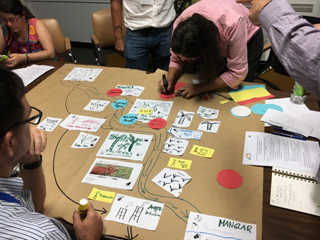 During the First Latin American Conference of the Ecosystem Services Partnership (ESP) held in the city of Cali (Colombia) from 18th to 21st of October, the project GIZ-Values organised a training on Impact-Oriented Ecosystem Service Assessment. The TEEB-Ecuador team participated in this training and presented the case of an inclusive cocoa value chain.
During the First Latin American Conference of the Ecosystem Services Partnership (ESP) held in the city of Cali (Colombia) from 18th to 21st of October, the project GIZ-Values organised a training on Impact-Oriented Ecosystem Service Assessment. The TEEB-Ecuador team participated in this training and presented the case of an inclusive cocoa value chain.
An interdisciplinary and international group of attendants suggested to focus on soil fertility, water quality, and soil erosion related to practices of cocoa farmers. This problem is of interest for the entire LAC region.
Text by Paul Herrera, TEEB Ecuador Coordinator
Status: Ended
Host Ministry:
Ministry of the Environment (MAE)
Research institutions:
Other partners
- National Planning and Development Agency
- Ministry of Agriculture & Livestock
- Vice-presidency Office – Productive Matrix Change Committee
- Ministry of Industries and Productivity
- National Secretariat of Water
- Ministry of Electricity and Renewable Energy
This study is supported by the European Commission as part of the “Reflecting the Value of Ecosystems and Biodiversity in Policy-Making” project.


